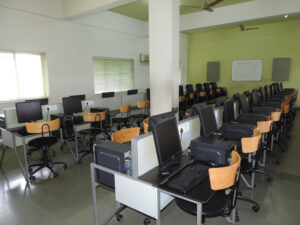Back to: Computer Studies JSS1
Welcome to class!
In today’s class, we shall be talking about the computer ethics – components of a computer room
Computer Ethics – Components of a computer room

In today’s digital age, computers have become indispensable tools in our personal and professional lives. However, with the increasing reliance on technology comes the need for ethical considerations regarding the use of computers and their impact on society. Computer ethics encompasses the principles and guidelines that govern the responsible use of computers and technology. It addresses issues such as privacy, security, intellectual property, and social responsibility.
Components of a Computer Room

A computer room, also known as a data center or server room, is a specially designed space that houses computer systems and related equipment. These rooms play a critical role in ensuring the reliability and security of data and applications. The essential components of a computer room include:
- Raised Floor: A raised floor provides additional space for cabling and ventilation, allowing for better air circulation and easier access to equipment.
- Power Distribution Units (PDUs): PDUs distribute power to the various equipment in the computer room, ensuring a stable and reliable supply of electricity.
- Uninterruptible Power Supply (UPS): A UPS provides backup power in case of a power outage, preventing data loss and downtime.
- Cooling System: Computer equipment generates heat, and a cooling system is essential to maintain a suitable temperature environment and prevent overheating.
- Fire Suppression System: A fire suppression system protects the computer room from fire hazards, using water, gas, or other extinguishing agents.
- Access Control System: An access control system restricts entry to the computer room to authorized personnel, ensuring physical security of the equipment and data.
- Network Infrastructure: The computer room houses network equipment, such as routers, switches, and firewalls, which enable communication between computers and the internet.
- Server Racks: Server racks provide a structured framework for mounting and organizing servers and other equipment.
- Cable Management: Proper cable management ensures an organized and clutter-free environment, facilitating maintenance and preventing tripping hazards.
- Monitoring and Alerting System: A monitoring and alerting system continuously tracks the health and performance of the computer room equipment, providing notifications in case of anomalies or potential issues.
Computer Ethics in the Computer Room
Computer ethics plays a crucial role in the operation and management of a computer room. Here are some key ethical considerations:
- Data Privacy: Protect personal and sensitive data from unauthorized access, collection, or use.
- Data Security: Implement robust security measures to safeguard data from cyberattacks, data breaches, and unauthorized modifications.
- Intellectual Property: Respect intellectual property rights by obtaining proper licenses for software and avoiding copyright infringement.
- Social Responsibility: Consider the social and environmental impact of computer technologies, promoting responsible disposal of electronic waste and minimizing energy consumption.
- Professional Conduct: Maintain professional standards of conduct, including avoiding conflicts of interest, respecting colleagues, and adhering to ethical guidelines.
By adhering to these ethical principles, individuals and organizations can ensure that computer rooms are not only secure and reliable but also contribute to a responsible and ethical use of technology.
We have come to the end of today’s class. I hope you enjoyed the class!
In case you require further assistance or have any questions, feel free to ask in the comment section below, and trust us to respond as soon as possible. Cheers!
Question Time:
- What are the key principles of computer ethics?
- How does computer ethics relate to concepts like privacy, security, and intellectual property?
- What are some examples of ethical dilemmas that arise in the use of computers?
- What role do laws and regulations play in enforcing computer ethics?
- How can individuals and organizations promote ethical behavior in the digital world?
